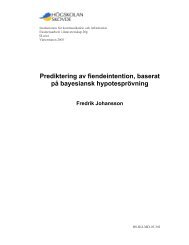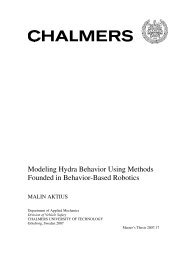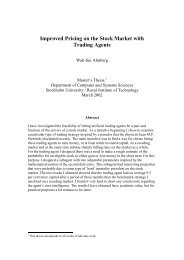Development of a Stemmer for the Greek Language - SAIS
Development of a Stemmer for the Greek Language - SAIS
Development of a Stemmer for the Greek Language - SAIS
Create successful ePaper yourself
Turn your PDF publications into a flip-book with our unique Google optimized e-Paper software.
2. The <strong>Greek</strong> <strong>Language</strong><br />
2.1 History <strong>of</strong> Modern <strong>Greek</strong><br />
The language that <strong>Greek</strong>s speak today was not always <strong>the</strong> same. It is based on <strong>the</strong><br />
Ancient <strong>Greek</strong> <strong>Language</strong> that was established in A<strong>the</strong>ns on <strong>the</strong> 5 th century B.C.<br />
As A<strong>the</strong>ns was dominating with its political and spiritual acme, more and more<br />
tribes living in Greece adopted <strong>the</strong> same language. Up to Alexander’s <strong>the</strong> Great<br />
era, Ancient <strong>Greek</strong> <strong>Language</strong> was spoken by <strong>the</strong> people living in Greece, Persia,<br />
Middle East and Egypt. During this Hellenistic Period, a lot <strong>of</strong> mixtures took<br />
place, adding new elements in <strong>the</strong> <strong>Greek</strong> language, especially <strong>the</strong> oral one. During<br />
Byzantine Empire, <strong>the</strong> <strong>Greek</strong> language changes again in syntax and grammatical<br />
<strong>for</strong>mation trying to make <strong>the</strong> written <strong>for</strong>mation simple as <strong>the</strong> oral one.<br />
After <strong>the</strong> Ottoman occupation (1453), <strong>the</strong> <strong>Greek</strong> language is almost only oral and<br />
it keeps being oral <strong>for</strong> almost 400 years. People use a kind <strong>of</strong> dialect totally<br />
different from <strong>the</strong> classical <strong>Greek</strong> and obviously effected from <strong>the</strong> Ottomans.<br />
After liberation (1821) <strong>the</strong> <strong>Greek</strong> nation needs a new <strong>for</strong>mal language, be<strong>for</strong>e<br />
starts to follow <strong>the</strong> evolution <strong>of</strong> <strong>the</strong> rest Europe. In <strong>the</strong> early 19 th century, <strong>the</strong>re are<br />
two dispositions in Greece; <strong>the</strong> classical who wanted to establish a <strong>Greek</strong><br />
language similar to <strong>the</strong> Ancient <strong>Greek</strong> and o<strong>the</strong>r scholars who wanted a simplified<br />
version <strong>of</strong> <strong>the</strong> <strong>Greek</strong> language more close to <strong>the</strong> spoken language <strong>of</strong> that period.<br />
After long time arguments Greece establish as <strong>for</strong>mal language <strong>the</strong><br />
“Katharevousa”, introduced by Adamantios Korais. Katharevousa is something<br />
between Ancient and Modern <strong>Greek</strong> and it was used as <strong>for</strong>mal <strong>Greek</strong> language up<br />
to 1976, even if most <strong>of</strong> <strong>the</strong> people were using Modern <strong>Greek</strong> in most <strong>of</strong> <strong>the</strong> cases.<br />
For reasons <strong>of</strong> simplicity, <strong>the</strong> <strong>Greek</strong> parliament accepted on 1976 <strong>the</strong> Modern<br />
<strong>Greek</strong> language, called “Demotiki”, as <strong>the</strong> <strong>of</strong>ficial language <strong>of</strong> Greece, which is<br />
<strong>the</strong> present <strong>Greek</strong> language.<br />
2.2 The <strong>Greek</strong> alphabet<br />
The alphabet <strong>of</strong> <strong>the</strong> Modern <strong>Greek</strong> language is <strong>the</strong> same with <strong>the</strong> Ancient one and<br />
it originates from <strong>the</strong> Egyptian and Phoenician alphabet. It is presented in <strong>the</strong><br />
Figure 4.<br />
11





